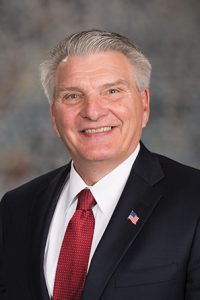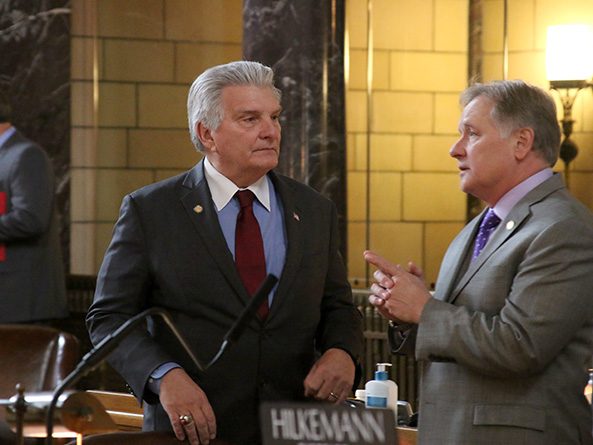Mid-budget cuts recommended
A bill that proposes cuts to the state’s budget for the current fiscal year was debated Jan. 31 and Feb. 1. The reductions are needed to offset an unexpected budget shortfall of nearly $1 billion.

LB22, introduced by Norfolk Sen. Jim Scheer at the request of Gov. Pete Ricketts, is part of the governor’s proposed expedited adjustments to the state budget ending June 30, 2017. The regular budget process for setting spending for the next two fiscal years will be taken up separately later in the session.
A pending Appropriations Committee amendment would become the bill. Sen. John Stinner of Gering, chairperson of the committee, said the amendment reflects only slight deviations from the governor’s proposed adjustments to appropriations and re-appropriations for state operations, aid and construction programs.
Stinner said the Legislature ended last session with a balanced budget but revenue growth has not kept up with projections, resulting in the anticipated revenue shortfall over the next two years.
Rather than calling a special session to address the issue, he said, it was agreed that lawmakers and the governor’s office would take a multi-step approach to addressing the problem by making an expedited round of budget adjustments early in the 2017 session. That process focused on re-appropriations, across-the-board cuts and strategic reductions, he said.
“This isn’t business as usual,” Stinner said. “This is making the thoughtful, prudent cuts that we have to make in order to rebalance the budget.”
The governor’s recommendations would have cut $8.2 million from the state Supreme Court’s budget, but the committee amendment would cut only half that amount. Stinner said the decision was made following warnings from Chief Justice Mike Heavican that the proposed cuts would set back recent reforms enacted by the Legislature to reduce the state’s prison population through alternative sentencing, probation services and other programs.
Speaking in favor of the amendment, Gothenburg Sen. Matt Williams said it was especially important to maintain necessary funding to carry out criminal justice reform.
“If we take away — through the budget process —the programs that are available to probationers and to those who are participating in drug courts, we have removed from the judges the opportunity to use probation and post-release supervision and drug court as an alternative to incarceration,” Williams said.
Lincoln Sen. Kate Bolz, vice chairperson of the Appropriations Committee, said members focused on adjustments needed to capture matching federal funds, keep grants intact that already had been allocated and maintain legislative priorities.
Calling LB22 “unique in both its scope and scale,” Bolz said the Legislature has expedited deficit budget bills in the past, but only to address specific issues — not to make across-the-board cuts to agencies in the middle of a fiscal year.
“This is a historic process,” Bolz said. “This is not typically the way we do business.”
The committee’s plan also would allow the University of Nebraska to retain approximately $5.2 million in unspent funds. The governor’s proposal would have re-appropriated those funds to the state’s general fund.
Lincoln Sen. Adam Morfeld, whose district includes the UNL campus, supported the amendment, but expressed concern regarding deep cuts to the university budget called for in the governor’s biennial budget proposal. Morfeld said cuts to important programs and institutions should not be the only tools considered to fix the state’s financial situation.
“It is also the responsibility of the Revenue Committee to find revenue to balance the budget,” he said.
The amendment also would add $3.5 million to the governor’s recommended appropriation to the state Department of Health and Human Services for residential providers to individuals with developmental disabilities.
Sen. Anna Wishart of Lincoln said the funds would partially offset the loss of $7 million in matching federal funds that the department lost due to an error in their provider billing process. Additional funds are required to ensure that necessary services continue to be provided, she said.
“These services support Nebraskans with developmental disabilities to be able to live and work as independently as possible in their communities,” Wishart said.
Among other provisions, the committee amendment also would restore:
• $600,000 of the $900,000 reduction proposed for the Storm Water Management Grant program to assist communities with federal storm water compliance obligations;
• $400,000 in funding to four education programs;
• $274,725 in across-the-board cuts to the Postsecondary Coordinating Commission;
• $75,000 to the Nebraska State Historical Society for compliance with the Native American Graves Protection and Repatriation Act; and
• $46,000 to the Commission for the Blind and Visually Impaired to leverage federal funds.
The Legislature adjourned for the day before taking further action on the bill.


